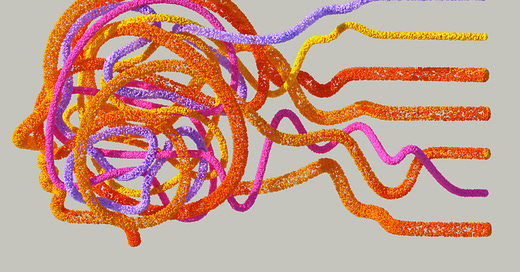Anxious or suffering from burn out? Follow me as we explore what could be behind it and how to break free and reclaim your calm. If you can’t seem to relax then you’ll want to hang out with me because that’s where I’m at. Let’s find out together.
First we’ll take a deep dive into understanding what is going on inside your body and then what we can do to make it better. I refrain from saying “fix it” because it isn’t broken. Your nervous system needs a little TLC and a readjustment on what it’s new default setting should be…cool as a cucumber.
Xanax and GABA
When the Covid lockdowns first began I started doing more research on my prescription, Xanax. (See the website regarding counterfeit Xanax pills.) Since it is a controlled substance and requires a written doctor’s prescription every month to get another month’s refill on my existing prescription, I wanted to get off of them. It was a pain to get them filled during “normal life” but with Covid it became more stress producing than it alleviated, at least for me. I wanted to stop taking them but I needed to learn more. What could I do instead?
I had read people’s comments on social media retelling accounts about quitting this drug (and other’s like it) cold turkey. For some people quitting abruptly caused suicide or suicidal thoughts. I saw warning messages in posts and knew I didn’t want to go there.
I had been on it for the same low dose for 10 years and only took it on occasion, when I really needed it, which may not be for weeks at a time. My monthly prescriptions would usually last me two and sometimes three months. It originally was prescribed for me by my cardiologist when all their conventional cardio drugs failed to lower my high blood pressure. I had been diagnosed with Left Bundle Branch Block (LBBB) and experienced dangerously high blood pressure.
Xanax improves GABA which acts on the vagus nerve, also called the “Wandering Nerve” . It meanders in and out throughout the body connecting all the vital organs and interacting with the nervous system. This is the direct highway in the nervous system that connects the brain, gut and the heart. The vagus nerve is such a vital nerve that we couldn’t live without it. So important I want to take some time to understand more about it and how it works.
The Vagus Nerve
The Polyvagal Theory
Understanding the vagus nerve will provide the basics you’ll need as we head into the next topic of the Polyvagal Theory introduced by Stephen W. Porges in the 1990’s. He provided a different approach to the nervous system than what the psychology world had always known and the one you probably learned about in school. I was taught the nervous system had two branches: the fight or flight vs. the rest and digest branch.
This new model provided a better understanding for working in an area that had been previously been neglected, the area of trauma. This new paradigm also highlighted the misdirection of prescribing many psychiatric drugs for what was never a chemical imbalance in the brain. This will also help to understand the mechanics of how neuroscience is developing at supersonic speed. We’ll talk more about that in another post.
I’ve included a video by Irene Lyons to explain the Polyvagal Theory better than I ever could. While researching for this post I found a lot of online resources on her website and others that I wanted to pass along to you.
I’ve created another TRAUMA RESOURCE page with free materials for you to download from Irene Lyon’s website. I have no affiliation with her practice nor her educational materials. I’m merely sharing with you what I’ve found.
The Polyvagal Theory Explained
Ten Ways to Increase Vagal Tone
So now you understand more about the vagus nerve you can understand how much it impacts the body. This nerve can lose “tone”, which is referred to as “vagal tone”, and can be measured by Heart Rate Variability (HRV). Many heart patients are put on beta blockers because of low vagal tone. I was.
I’ll be sharing some other ways to improve vagal tone naturally but for now, here’s a few things I learned that you can do by yourself (except #8) and for yourself, at no cost.
Sing, hum, chant or read aloud. (The vibration of your vocal chords stimulate the vagus nerve by the voice box.)
Gargle. (again, the vibration by the voice box.)
Play a wind instrument. (The facial muscles stimulate and tone the vagal nerve.)
Following a warm shower with much cooler water for the last few seconds or splash cold water on your face. Polar plunges if you don’t have a heart condition. (The quick change in temperature causes a nervous system response which activates the vagus nerve and improves tone.)
Massage. (I’ve included a video below teaching you how to do a vagus nerve massage.)
Mindfulness. (Spending time in nature, living for the moment.)
Intimacy.
Gentle Exercise - Walking (esp. in nature) or Gardening (grounding with the earth and sunshine).
Listening and/or watching relaxing music or videos like the one I made. Heaven in MY Garden.
Vagus Nerve Massage for Stress and Anxiety Relief (TMJ tension too)
We are delving into the subject of neuroscience which is pretty complicated. So I’m spending a little more time introducing the concepts that will help us dive deeper. I will do my best to explain what is REALLY going on with this upside world we’ve been living in. But before I do, I’m asking you to keep an open mind and think for yourself.
Today’s feature photo by Google DeepMind on Unsplash




